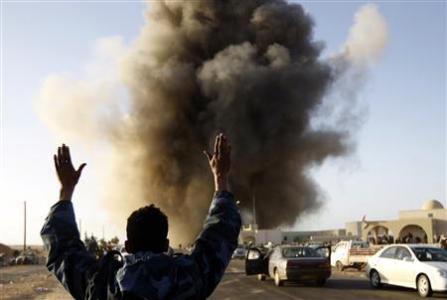Libyan rebels have been facing fierce air strikes by ruler Muammar Gaddafi’s forces as calls for a no-fly zone mounts, while US president Barack Obama has warned that military intervention is possible.
Libyan rebels have been facing fierce air strikes by ruler Muammar Gaddafi’s forces as calls for a no-fly zone mounts, while US president Barack Obama has warned that military intervention is possible.
Gaddafi supporters are moving eastward in an effort to push the rebels back and recapture fallen towns, with reports emerging that they have taken the central Libyan town of Bin Jawad.
The loyalists have moved on to the oil port of Ras Lanuf, where a fighter jet carried out an air strike Tuesday with a big plume of dark grey smoke rose over the highway, an AFP news agency reporter said.
The missile appeared to fall about eight kilometers east of the strategic oil town, which is the eastern front of the rebels' battle to bring down Gaddafi after four decades in power.
It was not immediately clear whether there were any casualties or damage.
Several people were reported to have been killed in Monday's battles, including a family trying to flee the fighting.
There has also been fierce fighting in the eastern city of Misurata, located between the capital, Tripoli, and Gaddafi's hometown Sirte, with reports of at least 18 people killed.
Witnesses reported that Az-Zawiyah also, west of Tripoli, was under heavy attack by government forces.
MILITARY INTERVENTION
On the other hand, US president said on Monday that the US and its NATO allies were still considering a military response to the violence even as Britain and France were drafting a UN resolution that would establish a no-fly zone.
Barack Obama said the US will stand with the Libyan people as they face "unacceptable'' violence. He also sent a strong message to Gaddafi, saying he and his supporters will be held responsible for the violence there.
British Foreign Secretary William Hague said that his country was “working closely with partners on a contingency basis on elements of a resolution on a no-fly zone, making clear the need for regional support, a clear trigger for such a resolution and an appropriate legal basis.”
But he said Arab and African support would be crucial, and there would need to be a clear trigger - most likely a sharp worsening of conditions for civilians.
Hague also said the move needed the legal backing of a UN resolution - an element also required by the US and NATO.
A French source said France was "working with our partners in New York on a no-fly zone resolution." Gulf states called for a no-fly zone and an urgent Arab League meeting.
NATO Secretary-General Anders Fogh Rasmussen stressed the need for U.N. authorization. "I can't imagine the international community and the United Nations would stand idly by if Gaddafi and his regime continue to attack their own people," he said.
"We have asked our military to conduct all necessary planning so that we stand ready at short notice," he added.
For its part, Russia a permanent member of the U.N. Security Council with veto powers, said it opposed foreign military intervention.
Russian Foreign Minister Sergei Lavrov said on Monday that a military intervention in Libya is not a remedy against crisis, adding that Libyans should solve their problems themselves.
Lavrov reiterated Russia's official position on the ongoing situation in the riots-hit Libya, saying the North African state needed political methods to stop the bloodshed.
HUMANITARIAN CRISIS
As the fighting intensifies, fears of a humanitarian crisis along Libya's borders are growing.
Hundreds if not thousands of people have died since Libya's uprising began on February 14 in an effort to end Gaddafi's more than 41-year rule, although tight restrictions on media make it near impossible to get an accurate number.
More than 200,000 people have fled the country, most of them foreign workers. The exodus is creating a humanitarian crisis across the border with Tunisia.
UN emergency relief co-coordinator Valerie Amos said up to one million foreign workers - who have either just left Libya or are still trapped there by the fighting - will need emergency aid in the coming weeks.
She said that $160m was needed for camp management, food, nutrition, healthcare, water, sanitation and hygiene.
